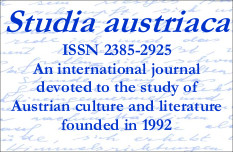Spazi “affettivi”: un’analisi spaziale di «Brennendes Geheimnis» di Stefan Zweig
DOI:
https://doi.org/10.13130/1593-2508/4861Abstract
This article aims at providing an interpretation and analysis of German literary works, especially of Stefan Zweig’s short story Burning Secret (2011), read through the lenses of recent theories on the interconnectedness of living space, identity formation and emotions. The reading here suggested moves from the analogy between literary investigations and proper Freudian suggestions. Zweig’s optimism in coming to terms with – and working through – the inner struggle of the adolescent main protagonist is here assimilated to a kind of modern folktale and becomes the “untimely” humane message that echoes classical ideals of the Weimar culture.Downloads
Downloads
Published
How to Cite
Issue
Section
License
Licensed under a Creative Commons Attribution 4.0 International License
This journal allows the author(s) to hold the copyright without restrictions.
This journal allows the author(s) to retain publishing rights without restrictions.







